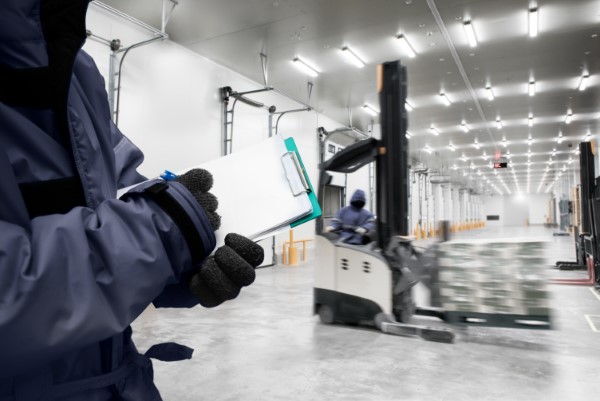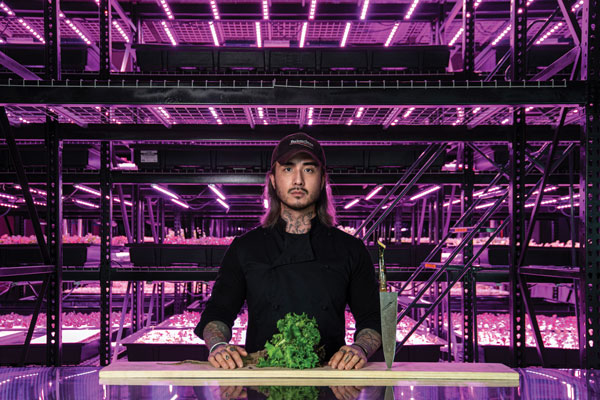Ohio’s vibrant food industry represents a fusion of two great Ohio traditions, agriculture and innovation. With some 75,800 traditional farms spanning close to 14 million acres, Ohio has long been a leading producer of such staples as soybeans, corn, tomatoes, dairy products and poultry. These farms represent a vital economic driver that supports thousands of jobs and generates more than $120 billion in annual revenues.
But the future of farming is expanding in Ohio, and that’s where Ohio innovation comes in. Nowhere is that more apparent than in the success of 80 Acres Farms, now the nation’s third-largest vertical farming enterprise. Founded in 2015 and based some 40 minutes north of Cincinnati in the small town of Hamilton, the company built its initial quarter-acre grow house to yield volumes of lettuce, tomatoes, herbs and microgreens equivalent to those produced by a traditional farm comprising 80 acres. Hence the company name, even as new efficiencies have boosted the facility’s production to 10 million servings of produce annually.
“We built a farm where robots do the heavy lifting, so humans can focus on growing the freshest, most nutritious food possible,” says the company, maintaining that it can produce up to 300 times more food than a typical outdoor farm, using no pesticides, 100% renewable energy and 95% less water. And it does so year-round, unencumbered by the vagaries of weather.
Since 2019, 80 Acres has been a supplier to Cincinnati-based Kroger and it currently serves more than 300 Kroger stores across the Midwest, with more on the way. In 2023, the company expanded its footprint with a $95 million facility in Kentucky. It plans to open a vertical farm in Georgia next year.
 Ohio is “outperforming” in cold storage.
Ohio is “outperforming” in cold storage.
Photo from Getty Images
In all, more than a dozen indoor farming ventures dot the Ohio landscape. Like 80 Acres Farms, Toledo-based Balance Grill and Balance Farms is in expansion mode. Founded in 2018 in a formerly vacant 30-story building, Balance Farms is an 8,600-sq.-ft. aquaponics facility that supplies the pan-Asian, vegetarian-leaning menu of the adjacent Balance Grill, both owned by University of Toledo graduates Prakash “P.K.” Karamchandani and HoChan Jang. With locations in Cleveland and Denver, Balance Grill recently opened in Dallas. The business remains committed to Toledo.
“Like a lot of places in the Midwest, Toledo has all the classic infrastructure,” Karamchandani told Site Selection magazine. “Innovation moved from here to the coasts, but now the coasts are so expensive. Technology,” he says, “is allowing people to innovate in places like Toledo that have a lower cost of living and a better quality of life.”
Meeting the Demand for Cold Storage
An eye-opening report in September 2023 by one of the nation’s top commercial real estate service providers describes how Ohio is emerging as a leader in another one of the food industry’s fastest-growing segments: cold storage. The analysis by Rick Kingery, leader of the Food & Beverage Practice Group at Colliers, characterized Ohio as one of a trio of Midwest states that is “outperforming” in major food industry investments and thus emerging as a pivotal player in the food and beverage space, which brings with it a greater need within the cold storage sector.
“The primary reason for this wave of investment focusing mainly on the Midwest region,” Kingery writes, “is its strategic positioning as a vital link connecting agricultural and animal production with the established distribution center networks.”
Surging demand for cold storage facilities is being driven by the rise of e-commerce and shifting consumer preferences brought on by COVID-19, such as a heightened demand for frozen foods and packaged dinners. With more than 1,400 food processors operating out of Ohio, cold storage facilities located there enjoy proximity to sources and one-day drive distribution to more than 60% of the U.S. and Canadian populations.
Supported by a $2 million investment from JobsOhio as part of the Ohio Site Inventory Program, Cleveland Cold Storage is a newly opened, 156,000-sq.-ft. freezer facility serving the food storage needs of Northeast Ohio. It offers a full range of frozen storage, distribution and transportation services for local, regional, national and international processors, grocers and distributors.
“Our goal,” said Nick Pacitti, head of sales for Cleveland Cold Storage, “was to focus on an individual cold chain corridor that could leverage the region’s food advantages, while keeping costs low and providing highly responsive services for customers and their customers.”
Big Investments Deliver New Jobs
As the Colliers report would indicate, Ohio has notched some impressive recent wins within the food and beverage sector. Pennsylvania-based Sheetz, which is expanding its network of higher end convenience stores into the Midwest, is investing a hefty $150 million in a food preparation and distribution hub in Findlay, the thriving town on I-75 about 45 minutes south of Toledo. The facility’s 750 projected jobs will offer average annual salaries and benefits of $60,000 according to Dan Scheaffer, director of the Findlay-Hancock County Alliance.
“Sheetz is thankful for the cooperation and support of all the local, county and state leaders who have helped make this project possible,” said Travis Sheetz, president and CEO of the family-owned company. “We’re excited to bring new opportunities to the area as we continue to expand throughout the State of Ohio and into Michigan,” said Sheetz, “Findlay is located in the heart of this new growth area and will play a big role in the future of Sheetz.”
Among more recent investments, International Foods announced plans in April for a $65 million food manufacturing facility that’s slated to bring 220 jobs to Cleveland. The Florida-based company produces Asian and Latin meals for institutional customers across the U.S. Cleveland Kitchen, which began as two brothers selling sauerkraut at a local market and has since become a national powerhouse in fermented foods such as kraut, kimchi and pickles, recently expanded in its hometown, more than doubling its workforce to 138. It was the first recipient of a new tax credit for companies that create at least 50 new jobs paying at least the city’s median income.
“We believe we have the best employees making food the world loves.”
— Carolyn Mendel, Plant Manager, Wellston General Mills
Something else the pandemic did was to increase demand for snacks. With sales of its Totino’s pizza snacks surging, General Mills recently expanded its longtime facility in the town of Wellston in rural southeastern Ohio, completing a $100 million investment in what is considered to be one of the largest food manufacturing plants in the country. The company received a tax credit from the Ohio Department of Development and a $400,000 grant from JobsOhio to support building, machinery and equipment.
“General Mills has been a proud and active member of the Wellston community for 18 years,” said Carolyn Mendel, plant manager of the Wellston General Mills. “We believe we have the best employees making food the world loves.”

